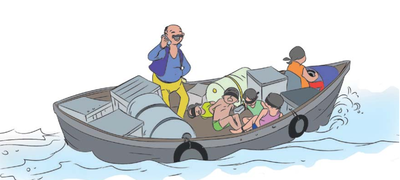Trafficking of children
Trafficking of children
Introduction
Child trafficking can be defined as any person under 18 who is illegally recruited, transported, transferred, harboured or received by threats, force, and coercion or inducing fear for the purpose of exploitation, either within or outside a country. Child trafficking is a common malpractice in India. Child exploitation is done for several reasons. Some of the primary reasons are:
- Sexual exploitation : children, especially girl children are lured into moving to another city and are forced into prostitution, sex tourism and pornography.
- Illegal activities : kidnapped children are often forced to beg, and sometimes their organs like kidney etc. are sold. These children are also often used for drug trafficking purposes.
- Labour : children brought into the city are sold as bonded labour to industry owners. They are often placed at factories of carpet weaving, diamond cuƫng etc.

Young girls are sold to older men who marry these girls or sell them to other men.
What the law says about trafficking of children :
Indian laws do not have a legal definition of child trafficking. The Immoral traffic (Prevention) Act deals only with trafficking of minors for prostitution. However, other laws are present which can assist in child trafficking – Indian Penal Code, Juvenile Justice Act 2000, Andhra Pradesh Devadasi’s (Prohibition of Dedication) Act, 1988, Bombay Prevention of Begging Act etc.
Role of panchayat members in preventing trafficking of children
Panchayat members can help prevent trafficking in many ways. They can generate awareness amongst parents about child trafficking and the risks and dangers involved; they should keep a record of families in the village migrating to cities; if a child goes missing, then panchayat members should immediately inform the nearest police station and seek legal assistance.
Source : NCPCR handbook on Safe Childhood Programme for Panchayat members
ಕೊನೆಯ ಮಾರ್ಪಾಟು : 7/1/2024
This topic provides information about 20th Livesto...
This topic deals with information related to Appen...
The Article provides information about Antioxidant...
This topic deals with information related to Anxie...
